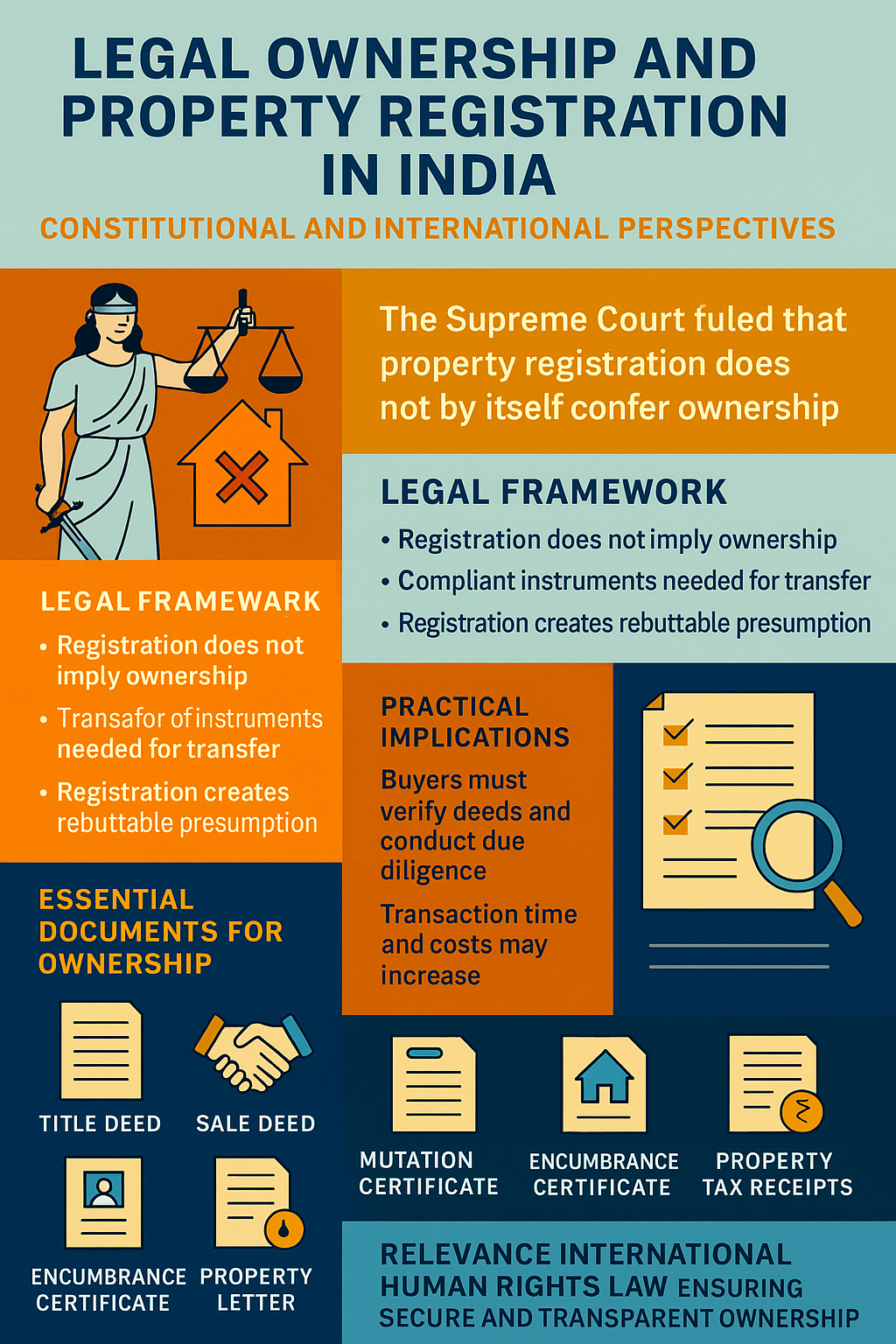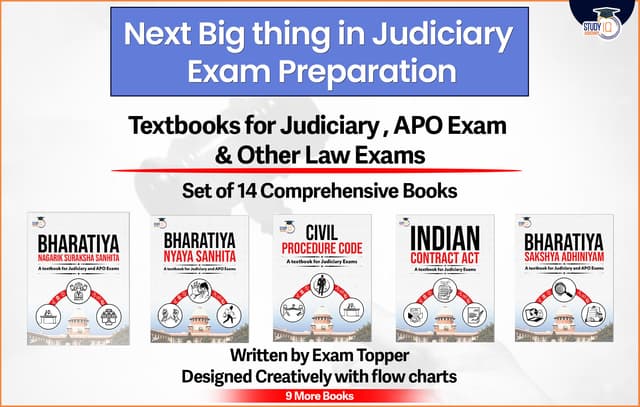Table of Contents
The Supreme Court of India’s April 2025 ruling in Mahnoor Fatima Imran & Ors. v. State of Telangana & Ors. has elucidated an essential legal distinction: property registration does not equate to property ownership. This decision, which is based on legislative interpretation, has significant socio-legal consequences for real estate transactions, citizen rights, and the government. The Court underlined the superiority of legal title and legal transfer over procedural adherence by deconstructing the misconception that the registration of immovable property independently establishes ownership.
The Supreme Court Verdict: Registration ≠ Ownership
- In the Mahnoor Fatima Imran case, the Supreme Court held that an unregistered sale agreement does not transfer ownership, regardless of whether the property is later registered in the buyer’s name or physically occupied.
- This originated from a longstanding dispute regarding land acquired in 1982 by Bhavana Cooperative Housing Society in Telangana through an unregistered deal.
- Notwithstanding the land’s validation by the assistant registrar in 2006 and subsequent possession by later purchasers, including the petitioners, the Supreme Court determined that possession or registration devoid of a legal title is inadequate to assert ownership.
- The Court underscored the need for a valid title deed in accordance with Section 17 of the Registration Act, 1908, which requires the registration of certain instruments, such as sale deeds and gift deeds, for them to have legal validity.
- The ruling emphasises that registration is solely a procedural formality and not a definitive proof of ownership.
- Historically, purchasers have regarded a registered sale deed as evidence of ownership.
- The Supreme Court has stated that the registration of a sale deed serves solely as a record of the transaction and does not inherently convey legal ownership.
- This ruling challenges the longstanding presumption that, upon registration of a sale document, the buyer’s ownership is indisputable.
- The court has highlighted the essential distinction between the registration of a deed and the actual legal possession of property.
- The ramifications for property developers are substantial. Simple registration of land will no longer be adequate to establish ownership.
- Developers must now establish a definitive legal title and oversee the resolution of any outstanding claims against the property. Transparency with potential purchasers regarding these issues will be imperative.

Legal Framework: Registration Act, Transfer of Property Act, and Beyond
- The decision is fundamentally based on the following legal foundations:
- The Registration Act of 1908 stipulates the registration of papers pertaining to immovable property; however, it does not confer ownership in the absence of a valid title.
- The Transfer of Property Act, 1882 stipulates that the legal transfer of property can only take place through documents that adhere to established legal criteria, namely, they must be written, registered, and executed by parties possessing a clear title.
- The Evidence Act of 1872 establishes that registration generates a presumption of accuracy; however, this presumption can be challenged by evidence of a defective or absent title.
- This ruling underscores the necessity of a chain of title and affirms the overarching legal doctrine that “nemo dat quod non habet“- one cannot convey a superior title than that which one holds.
Constitutional Dimensions: Article 300A and Right to Property
- Although the Constitution of India no longer designates the right to property as a fundamental right following the 44th Amendment in 1978, Article 300A stipulates that “no person shall be deprived of his property save by authority of law.” This establishes property as a constitutional legal right.
- The ruling adheres to this concept by stipulating that ownership cannot be asserted solely by registration or possession; it must be “by authority of law.”
- Safeguarding legal ownership through procedural regularity and substantive title honours the essence of Article 300A, fostering legal certainty and constitutional due process.
- Furthermore, the verdict upholds Article 14 (equality before the law) by restricting arbitrary and false property claims, which frequently disproportionately impact vulnerable populations lacking the resources for extensive due diligence.
Practical Implications for Property Buyers and Realtors
The verdict has produced a dual effect:
1. Comprehensive Evaluation and Legal Precision
- Purchasers are now required to verify:
-
- A complete chain of title
- Valid sale deed
- Adherence to registration requirements
- The absence of encumbrances
- Verified possession
- Realtors and legal consultants must perform title searches and get supporting documents like as mutation certificates, tax receipts, and encumbrance certificates to verify a clear title.
2. Elevated Expenses and Duration
- The ruling prolongs transaction time and elevates costs, yet it improves legal transparency, diminishes litigation, and fortifies the enforcement of property rights.
Essential Documents for Proving Legal Ownership
To establish legal ownership, the following documents are essential:
| Document | Purpose |
| Title Deed | Primary proof of ownership |
| Registered Sale Deed | Legal transfer of title |
| Mutation Certificate | Reflects a change in ownership in municipal records |
| Encumbrance Certificate | Shows no pending liabilities |
| Possession Letter | Indicates physical transfer of possession |
| Property Tax Receipts | Evidence of civic ownership |
| Will/Gift Deed | Inheritance-based ownership proof |
These documents collectively support ownership claims, especially in contested or legacy cases.
Relevance in the International Legal Arena
- Worldwide, secure property rights are regarded as essential for economic progress and legal stability.
- The World Bank’s Doing Business Index evaluates countries based on the simplicity of property registration, while also emphasising the significance of legal clarity and the enforceability of rights.
- The Universal Declaration of Human Rights (Article 17) acknowledges the right to property within international human rights law, while emphasising legal safeguards against arbitrary deprivation.
- The Indian Supreme Court’s ruling conforms to international standards that guarantee legal, secure, and transparent ownership.
- Furthermore, within the framework of the United Nations Sustainable Development Goals (SDG 1.4), which seek to guarantee equitable rights to ownership and control of land and property, this verdict underscores the necessity for legal registration and ownership verification to mitigate vulnerabilities in land tenure.
- Countries such as the UK, Australia, and Canada have developed land registration systems (e.g., Torrens system) that guarantee the indefeasibility of registered titles, contingent upon earlier legal disputes, reflecting the core principle of this Indian case, where substantive legality prevails over procedural formalities.
Way Forward
- The Supreme Court’s ruling in the Mahnoor Fatima Imran case reaffirms a fundamental principle in property law: registration alone does not constitute legal ownership.
- Ownership comprises valid title, legal transfer, registration, and possession.
- The verdict enhances procedural expectations while strengthening property rights by mitigating fraudulent transactions and upholding constitutional due process as stipulated in Article 300A.
- This ruling strengthens the dependability of India’s property law system by basing ownership on a legally valid title instead of mere formality.
- This indicates to the international community that Indian jurisprudence is progressing under global standards of property rights, transparency, and the rule of law.

 Warring Couples Cannot Make Courts Their...
Warring Couples Cannot Make Courts Their...
 Tackling Child Trafficking in India: Leg...
Tackling Child Trafficking in India: Leg...
 In Overcrowded Prisons, Justice Has Lost...
In Overcrowded Prisons, Justice Has Lost...



















